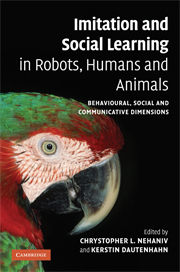 Imitation and Social Learning in Robots, Humans and Animals
Imitation and Social Learning in Robots, Humans and Animals Published online by Cambridge University Press: 10 December 2009
Matching behaviours
Numerous insightful descriptions of mechanisms that could be responsible for generating particular examples of social learning and related phenomena in ethology and psychology have been described (see e.g. Zentall and B. G. Galef, 1988; Heyes and Galef, 1996; Tomasello and Call, 1997; Byrne and Russon, 1998; Byrne, 1999; Heyes and Ray, 2000; Dautenhahn and Nehaniv, 2002). For robotics and software, particular general methods for solving such problems have been proposed by Nehaniv and Dautenhahn (2001) and Alissandrakis et al. (2002). Despite variations in embodiments and what they afford agents (biological, software or robots), this raises the possibility for harnessing sociality and of an artificial basis for cultural transmission of skills in societies of artifacts, which might also learn from and interact with humans (Dautenhahn, 1995; Billard and Dautenhahn, 1998; Alissandrakis et al., 2003a, b; Chapter 12, this volume).
To formulate problems of matched behaviour in general, we use the following variant of Mitchell's (1987) definition of imitation for what we will call matching behaviour:
A behaviour C is produced by an organism and/or machine, where
C is similar to another behaviour M,
Registration of M is necessary for the production of C, and
C is designed to be similar to M.
Note that novelty and learning are not explicitly required here, and whether or not the entire behaviour, or its application, or its components or some combination of them is novel or being learned is left open (see Whiten, 2002b; Dautenhahn and Nehaniv, 2002).
To save this book to your Kindle, first ensure [email protected] is added to your Approved Personal Document E-mail List under your Personal Document Settings on the Manage Your Content and Devices page of your Amazon account. Then enter the ‘name’ part of your Kindle email address below. Find out more about saving to your Kindle.
Note you can select to save to either the @free.kindle.com or @kindle.com variations. ‘@free.kindle.com’ emails are free but can only be saved to your device when it is connected to wi-fi. ‘@kindle.com’ emails can be delivered even when you are not connected to wi-fi, but note that service fees apply.
Find out more about the Kindle Personal Document Service.
To save content items to your account, please confirm that you agree to abide by our usage policies. If this is the first time you use this feature, you will be asked to authorise Cambridge Core to connect with your account. Find out more about saving content to Dropbox.
To save content items to your account, please confirm that you agree to abide by our usage policies. If this is the first time you use this feature, you will be asked to authorise Cambridge Core to connect with your account. Find out more about saving content to Google Drive.